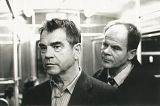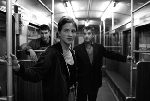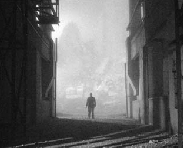Strange shots of a semi-derelict factory pan up to the sky, making it look like an eye. Next, swirly cut-off pipes, cement and concrete debris signify the desolation of a disused workplace, as the camera cuts to a middle-aged man at home, looking through the papers for a job - our introduction to Walter, the protagonist in Andreas Keinert's Wege in die Nacht (Paths in the Night, 1999).
It is obvious that Walter used to work at the factory and we discover later that he was a manager. These images run together to provide a compelling introduction to a visual feast which is both rich and unnerving.
Tragic anti-hero
Kleinert, who was born and grew up in the East Berlin, describes the 55-year-old Walter as a Shakespearean figure, similar to Macbeth: on the one hand you admire and sympathise with him, while on the other you reject and dislike him. One of Kleinert's producers, Katrin Schlösser from Ö-Film, told CER that this was one of the problems in securing financing for the film: no one wants an anti-hero as a lead figure. This is clearly the case with Wege in die Nacht as there is not much about Walter to redeem him. At times violent, he seems throughout to be cold and distant (I think I counted two smiles in the entire film.)
The factory in which Walter (Hilmar Thate) worked closed down as a direct result of the changing economic climate following German re-unification, causing him to become disillusioned with his life and with the state east Germany is in. All this is implied but not talked about within the film as, at night, Walter travels on trains with two younger partners - a woman Gina (Henriette Heinze) and a man René (Dirk Borchardt) - directing their activities as vigilante "peace" patrollers, combating train-borne violence with their own brand of justice.
 |
| Walter: Cold, distant, violent |
From then on, the film tracks Walter's degeneration into increasing loneliness and frustration, particularly as he becomes aggressive towards his wife, the family's sole bread-winner, who is blossoming in her new restaurant job. His inability to command respect from his wife and from Gina and René - who discover his Communist past - leads him first to rob a jewellers and ultimately his death, appropriately at the factory where he worked all his life
Going down
Wege in die Nacht charts the desperate, downward spiral of one man into the depths of depression - a depression caused by unemployment, the destruction of the system under which he has lived his entire life and his refusal to learn to run with the new. The choice of black and white to represent this life is entirely appropriate, as it accentuates the bleakness of Walter's existence and makes his "Wege in die Nacht" almost theatrical in places.
Speaking to CER, Kleinert said he did not want to make a naturalistic film, but rather wanted his story to be a quasi-model of the world. Within this context, it seems strange that he has consciously avoided using background music in any part of the film other than where it would naturally occur.
 |
| Gina: drumming fan |
Cannes success
But this is Kleinert's talent. He tells a story using surprising tools: an anti-hero, a lack of non-diegetic music, bleak imagery and suggested violence that, while it is never seen, makes you wince nonetheless. There is scarcely any light relief, yet you remember Wege in die Nacht and recognise it as a universal story. This was clearly the case at the Berlin Film Festival, where the film was well received, and also at Cannes, where it was shown as part of the Director's Fortnight last year.
In Germany, this film is seen by some as an East- versus West-Germany story and an insight into what working life under the GDR was like. It is also seen as an indictment of the negative social and economic effects of reunification, a common stance which West Germans often resent.
To an outsider, however, this story is an international one: a compelling though depressing film by a director who will surely go far.
Elke de Wit, 17 April 2000
Rosa von Praunheim's Der Einstein des Sex |
Veit Helmer's Tuvalu |
Sebastian Schipper's Absolute Giganten |
Frieder Schlaich's Otomo |
Bernd Eichinger's Der Große Bagarozy |
Thorsten Schmidt's Schnee In Der Neujahrsnacht |
Doris Dörrie's Erleuchtung Garantiert |
Leander Haußmann's Sonnenallee |
Maren-Kea Freese's Zoe |
Click here for the Berlinale website |
Moving on:
- Return to the CER front page
- For more articles on Central and East European film see the Kinoeye Archive



